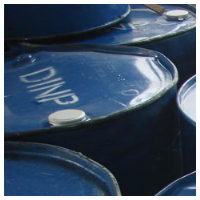California Puts Another Dangerous Plastics Chemical on Prop. 65 List
 Diisononyl phthalate (DINP)
Diisononyl phthalate (DINP)
Tis the season for list-making, but there is one list no petrochemical company wants to see its name on: California’s Prop. 65 list of substances known to cause cancer or affect reproduction.
On Friday, California’s Office of Environmental Health Hazard Assessment (OEHHA) announced it was adding diisononyl phthalate (DINP) to the list of 900+ chemicals that consumers should know are in the products they use on a regular basis.
DINP is used in a range of industrial products, including electrical wire, cables, coated fabrics, auto parts, vinyl flooring, gloves, footwear, school supplies and roofing materials. In the words of the American Chemical Council, “Phthalates are the most commonly used plasticizers in the world.”
Putting a chemical on the list does not ban it. Businesses are required to provide a “clear and reasonable” warning before knowingly and intentionally exposing anyone to a listed chemical. Once a chemical is listed, businesses have 12 months to comply with warning requirements.
The chemical is the 11th addition to the Prop. 65 list this year. Six different phthalates have made the Prop. 65 list since DEHP was listed as a carcinogen in 1988. They are a common class of chemicals used in many household products and polyvinyl chloride (PVC) plastic. Phthalates enhance softness and flexibility, and help retain product scents.
They have been linked to early puberty in girls, premature births, sperm damage in men and genital defects in boys. ExxonMobil stepped up to the plate to defend the petroleum industry when OEHHA zeroed in on DIDP in 2007. It unsuccessfully sued to not only keep DIDP off the list, but to have the entire list declared illegal.
“Diisononyl phthalate was considered by the Carcinogen Identification Committee (CIC) in its official capacity as the “state’s qualified experts,” OEHHA wrote on its website. “The CIC determined that the chemical was clearly shown, through scientifically valid testing according to generally accepted principles, to cause cancer.”
ExxonMobil, the American Chemistry Council, California Manufacturers & Technology Association, the California Building Industry Association and BASF Corp. were among industry groups that disagreed with the OEHHA assessment and opposed its action.
“We challenge the scientific basis of California’s decision,” the High Phthalates Panel of the American Chemistry Council wrote in a press release.
–Ken Broder
To Learn More:
Phthalates: Soft Plastic's Hidden Hazard (CBC News)
Toxic Chemical Found in Toys and Vinyl Plastic Linked to Cancer Added to California Proposition 65 List—Phthalate DINP (Workgroup for Safe Markets)
DINP Plasticizer Gets Booted Out in California (by Lilli Manolis Sherman, Plastics Technology)
Retailers Accused of Ignoring State Laws on Carcinogens in Baby Products (by Ken Broder, AllGov California)
- Top Stories
- Controversies
- Where is the Money Going?
- California and the Nation
- Appointments and Resignations
- Unusual News
- Latest News
- California Forbids U.S. Immigration Agents from Pretending to be Police
- California Lawmakers Urged to Strip “Self-Dealing” Tax Board of Its Duties
- Big Oil’s Grip on California
- Santa Cruz Police See Homeland Security Betrayal in Use of Gang Roundup as Cover for Immigration Raid
- Oil Companies Face Deadline to Stop Polluting California Groundwater





